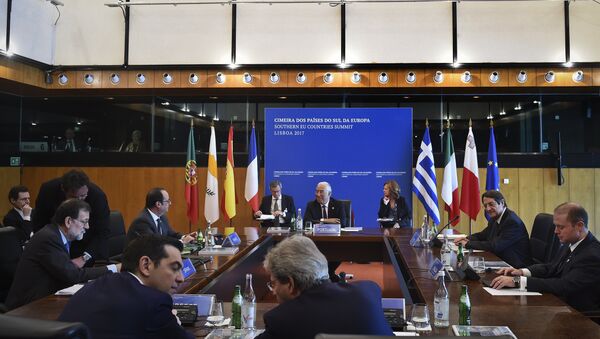The summit was attended by the leaders of Cyprus, France, Greece, Italy, Malta, Spain and Portugal.
Ahead of the meeting, Portuguese Prime Minister Antonio Costa called for urgent reform in the EU to combat the "legitimacy crisis which is weakening it," and referred specifically to an increase in "protectionism and populism."
Portuguese officials also said that the seven countries were slated to discuss closer cooperation on border security, the fight against terrorism and ways of improving economic growth.
It was the second meeting held by the so-called "Club Med" group, after Greek Prime Minister Alexis Tsipras organized a similar conference in Athens in September.
He said the summit was an opportunity to discuss objections to the austere economic policy and the migrant policy favored by northern Eurozone members, including Germany.
"Our countries were hardest hit by the economic crisis … and are now on the front line of the migrant inflows," Tsipras said, calling on the group to adopt "a common approach, common positions," to their problems.
The European debt crisis began in 2009 when Cyprus, Greece, Ireland, Portugal and Spain were unable to pay or refinance their sovereign debt, or bail out over-indebted banks.
With the exception of Spain, these countries entered bailout programs financed by Eurozone members and the IMF, which Ireland and Portugal exited in July 2014 followed by Cyprus in March 2016.
Greece remains in need of financial assistance and owes around $320 billion to its creditors. On Friday the IMF called Greece's debt "highly unsustainable" and warned it will reach 275 percent of GDP by 2060 unless the country's loans are significantly restructured.
Vasiliy Koltashov, Director of the Institute of Globalization and Social Movements' Center for Economic Research, told RT Russian that despite their misgivings, the "Club Med" group has little prospect of resisting the political direction of Brussels and Berlin, in part because they remain political insiders.
"These countries' governments are too indecisive to withstand confrontation with Berlin. They don't have any fundamental differences with the 'Eurocrats.' This union will not survive the first test of strength."
"These negotiations are most likely being held for populist reasons, the authorities are trying to demonstrate to their citizens that they are leading some kind of fight for their interests with the European authorities."
"As for France, despite its impressive economy, Paris has long lost its influence in the European Union and has consigned itself to a subordinate position that fully follows the course of Brussels. This situation can only change if opponents of the EU come to power in France," Koltashov said.
Never miss a story again — sign up to our Telegram channel and we'll keep you up to speed!




